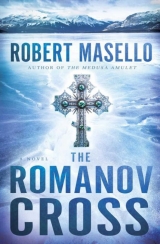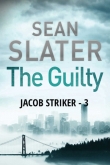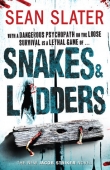
Текст книги "The Romanov Cross"
Автор книги: Robert Masello
сообщить о нарушении
Текущая страница: 27 (всего у книги 35 страниц)
Chapter 51
The lights flickered and dimmed as an Arctic blast pummeled the walls of the mess tent, and for a few seconds Professor Kozak thought his computer was about to crash. But the generators kept humming and, despite the muffled roar of the wind, the structure held firm. He poured himself another shot of vodka.
It was only a few hours since the helicopter had left with Slater and Nika aboard, but already the colony felt increasingly forlorn and abandoned. Dr. Lantos was gone, and though he hoped for a miracle, he did not think that one would be forthcoming. He didn’t see how she could have possibly survived her injuries, or the protracted evacuation to Juneau. Besides himself, only Sergeant Groves and Rudy remained, and they were out on patrol, making sure the island had no other intruders, and that nothing further occurred to disturb the eviscerated corpse of the deacon. Presumably, the poor man was still lying on the slab in the autopsy chamber.
The professor did not envy Frank Slater. This was not a mission report he would ever want to write. Whatever couldgo wrong, hadgone wrong … and badly. He could only assume that it spelled the end of Slater’s career as a field epidemiologist.
He returned his gaze to the images on his computer, pictures of what the Russian Orthodox church called the Theotokos. All were representations of the Virgin Mary and Child, but in four traditional poses. The Hodigitria, in which the Virgin pointed to the child as a guide to salvation. The Eleusa, in which the child touches his face to his mother’s, symbolizing the bond between God and mankind. The Agiosortissa, or Intercessor, in which Mary holds out her hands in supplication to a separate image of Christ. And, finally, the Panakranta, depicting Mary on a royal throne, with the Christ child in her lap; according to the Fourth Ecumenical Council, it was in this configuration that the two were represented as presiding over the destiny of the world.
Although Frank had given him only the roughest description of the icon they had freed from the deacon’s frozen hand – and which had now been stolen by some unknown hand – Kozak was confident that this last design, more regal than the others, was the right one. The red veil over her head was a symbol of her suffering, the blue dress a mark of her bond with humanity. The three diamonds that Slater had mentioned – on the Virgin’s forehead and shoulders – were meant to suggest the Holy Trinity.
From the communications desk in the corner, there was a burst of static, and then a ghostly voice from the Coast Guard station in Point Barrow, warning of another storm front swooping down on the Bering Strait. How, and why, Kozak wondered, had these settlers decided to plant their colony in this most unforgiving of places? The wind howled around the tent, and he was reminded of the terrors he had felt as a boy, reading late in his tiny room at the top of the stairs of the summer dacha. Every June his family had left their palatial flat in Moscow – high on Kutuzovsky Prospect – and gone to this wretched house in the middle of nowhere for “the fresh air.” As far as Vassily was concerned, the air was plenty fresh in the city libraries. The house had no electricity, and he had had to read his books by the light of a kerosene lantern. He could smell its smudgy odor even now and envision the rough log walls. Every time a branch had brushed against the eaves, or a window frame had whined, he had imagined that a rusalkawas beckoning to him from the riverbank. Pale maidens, garlanded with flowers, they were said to lure the unsuspecting to their watery lairs and drown them there; the gardener told him that he had once chased a rusalkaoff the end of the dock with his pitchfork. “So don’t you worry, young Vassily,” he’d said. “They won’t be coming around here anymore.”
But young Vassily had worried, all the same.
There was a question from the Coast Guard operator in Point Barrow—“Do you read me, St. Peter’s Island? Do you read me?”—and Kozak had finally gotten up from his chair and replied.
“Yes, we read you, loud and clear. This is Professor Vassily Kozak, of the Trofimuk United Institute of Geology, Geophysics, and Mineralogy.”
There was the crackle of static, then an uncertain, “The what institute? Are you also with the AFIP mission? Under Dr. Frank Slater? Over.”
Apparently, word had not yet traveled everywhere that Frank had been officially relieved of his duties.
“I am.”
“Okay then. Well, we’re clocking winds speed of over one hundred miles per hour and barometric pressure that’s dropping like a stone – ninety-eight millibars at last reading. You might want to batten down the hatches real tight, for at least the next twenty-four hours.”
“Thank you for that warning,” Kozak said, stifling a belch. “I will batten down all hatches. Over.”
Then he had shuffled back to his seat, poured another stiff shot of vodka, and riffled through the tattered pages of the book found in that dead boy’s pocket. Nika had said his name was Russell.
The book, as Kozak had surmised at first glance, was the sexton’s register, a record of the burials in the colony’s graveyard. Where Russell had come by it, no one knew, but Kozak had a pretty good idea. Somewhere in the woods, not far from the cemetery, there was probably an old hovel, tumbled down and overgrown by now, where the sexton had kept his tools, his ledgers, and the headstones. Once the storm had passed, he would have to recruit Sergeant Groves and go looking for it.
The bottle of vodka was running low. Fortunately, he had packed several others.
The pages that had been left in the book showed a surprising scrum of entries all dating from the autumn of 1918, along with some notes on the dynamite the colonists had used to blow open graves to a sufficient depth. Eight-inch sticks, made in Delaware by DuPont. Manufactured to kill the Germans on the battlefields of the First World War, the dynamite had instead been used to help bury Russian pacifists thousands of miles from any front. Kozak was pleased to find this proof of his theory. No wonder this cliffside was crumbling faster than even global warming could have predicted.
But it was when he turned to the last few pages of the ledger, written in a more feminine hand, that he put his glass down and sat up straighter in his chair. The ink was considerably faded, and the pages still damp around the edges, but it was clear that the sexton was no longer their author. Had he died? Was this new writer his replacement? Where the book had been a cursory list of names and dates, there were suddenly plaintive appeals, mixed in among the last death entries, and all written in a more formal Russian.
“Forgive me,”one anguished note read. “I have become the curse of all who know me, both at home and here in this awful place.”
Below it, she had dutifully entered another burial entry, this one for a man named Stefan Novyk, “Deacon of our holy congregation.”So that was his name – it had been obliterated from the headstone, but now the strange motif chiseled into the stone made perfect sense. The two doors in the upper corners had symbolized the deacon’s doors … leading through the iconostasis to the altar behind. The place where the true treasures of the church were, traditionally, kept secret and protected. “It was he who saved me from the wolves, and he who gave me shelter. And this is how I have rewarded him.”
The next few lines had become blurred and illegible, but below them, scrawled in what looked like a trembling hand, one last burial was recorded.
“Tonight, the Lord saw fit to return to me the mortal remains of Sergei Ilyinsky, my own poor, sweet, loyal, and much beloved Sergei. His body was washed up on the shore of this accursed island, and I have buried it myself in the last grave. I can dig no more. Around his neck, I have placed the emerald cross once given to me by the holy man in St. Petersburg. May it guard Sergei on his journey now … and may its chains no longer bind me to this earth. I long to be released, but I fear that its blessing has now become my curse.”
Kozak sat back in his chair, deeply moved by the anguish and loneliness of this anonymous woman. The rest of the page was empty, and Kozak turned it eagerly to see if there was anything more.
In the center of this last page were the words, “My soul endures here … forever. Mother of God, deliver me.” Just below, there was a signature that made his heart stop. He quickly tossed down a generous shot of vodka. The lights in the tent dimmed and flickered, and he wondered if it might be the aurora borealis, disturbing the magnetic and electrical fields again. But he was in no mood to go outside and see. Not now.
When the lights burned bright again, he read it once more.
But it was still the same.
He drained the rest of the vodka, and as he plopped the empty bottle on the table, the lights again did go out, plunging him into darkness. Alone with his thoughts, and the ancient ledger, he felt the same eerie chill he had felt as a boy when it was the rusalkahe had imagined coming back from the dead.
Chapter 52
Slater stood up again and surveyed his work. He wasn’t proud of what had happened, but he had dealt with its repercussions as best he could.
With Nika’s help, he had pried Bathsheba out of the snowbank, and after a quick examination, determined that apart from a few bruises, the worst damage she’d suffered might be a fractured tibia. She could walk, but not well, and she had had to be suspended between Slater’s and Nika’s shoulders to make it back up into the house. Even then, she seemed to be more worried about Harley than she was about herself.
“It’s all Charlie’s fault,” she said, wincing with the pain. “Charlie gets him into trouble all the time. All Harley needs is somebody to take care of him, somebody that understands him.”
Slater and Nika exchanged a look; it sounded like she was describing one of the bad-boy characters from some romance novel. Using the supplies from the ambulance, Slater set her leg, made her comfortable on the sofa, then, because he could not have her warning the brothers that he was in pursuit – or worse yet, wandering off into town – he gave her a healthy shot of a painkiller before she even knew what he was up to. Enough not only to lessen the discomfort, but to leave her in a happy twilight state for several hours.
Rebekah had presented a bigger problem. He had regretted having to hit her so hard with the butt of the rifle, but when someone was trying to kill you, you didn’t have much choice. She was still unconscious, which was a good thing in that it allowed him to check her out without having to fend off another attack. Her lip was split, she had cracked a tooth in front, but her airways were clear and her heartbeat was regular. When she woke up, she’d be in a lot of pain – he left a bottle of Vicodin in plain sight, though he had no idea if her religious convictions allowed her to take it – and then, to be on the safe side, he used the rope her sister had brought to tie her to a folding chair.
“Take the cell phones, too,” Slater said, and Nika snatched them off the desk. The guns he took himself. “Okay then,” he concluded, “we’ve done what we can here. Let’s hit the road.”
Outside, the snow was falling so thickly he had to haul the shovel out of the back of the ambulance and do a little digging to provide some traction for the back tires. Nika confessed to feeling a bit unsteady – not surprising after all that had just happened – and Slater took the wheel. Even with only one headlight working, he could see tire tracks leading out of the Vane driveway and off in the only other direction available … toward Nome. Under his shirt, he could feel the ivory owl Nika had given him, and if ever he needed its help seeing in the dark, now was that time.
High overhead, but concealed by the storm, he could hear the roar of another helicopter racing toward Port Orlov. Whichever branch of the military or civilian authority had dispatched it, the overall emergency response, he knew, would be growing by the minute. The town of Port Orlov would be under a complete and rigorously enforced quarantine until further notice, and he was lucky to have gotten out when he did. Only he knew the full extent of the deadly cargo Harley and Charlie might be carrying in their pockets – or in their veins – and he was determined to avert any further catastrophe from occurring. As the head of the mission, he was responsible for allowing it to start, and now he was equally determined to be the one to quell it.
For a second, he wondered who would be assigned to replace him. Whoever it was had undoubtedly already been chosen. There was no time to waste.
“Call the sheriff,” he said to Nika as he gripped the wheel with one hand and rummaged around in the console between the two front seats. “Tell him about the women, and tell him not to let anybody in or out of the Vanes’ house until a hazmat team gets there. Full precautions have to be taken.” Although they had both been as careful as they could be – indeed, he could feel a pool of sweat cooling inside the thermals he wore under the damp hazmat suit – viruses were among the sneakiest things on earth. And this one, though its primary mode of transmission was airborne, thrived in the blood and flesh and bodily fluids of its carriers.
While Nika made the call – and he could tell she was getting static from Sheriff Ray – he found in the console a pair of woolly mittens, assorted loose meds, and a petrified Almond Joy bar. When she got off, she said, “I think we’re both going to be under arrest before this is all over.”
“Been there, done that,” he said, with a half smile. “Here, have some dinner,” he said, offering her the candy bar. “You’re looking peaked.”
“Not hungry.”
“Eat it, anyway. You need to keep up your strength.” She was slouched low in her seat though maybe it was just to avoid the stiff breeze blowing through the hole that the shotgun shell had left in the windshield.
With the gloves on, she had to fumble at the wrapper, and as she did so, Slater leaned forward in the driver’s seat and stuffed a mitten into the hole. He was afraid that if he pushed too hard, the rest of the window, crazed with a thousand fissures, would give way, but for the moment it appeared to be holding.
“How can you see around that?” Nika asked.
“Who said I could?”
So far, he hadn’t passed any other cars or trucks, which meant that the roadblock was probably already in place somewhere up ahead. But he feared that if the Vane brothers hadn’t been stopped by now, they might have found a way to slip through the net. And the unfolding of that scenario was too dreadful even to contemplate. How wide would the dragnet eventually have to be? And what kind of panic might ensue if they tried to enforce it on a much more extensive scale?
He rubbed the side of one eye, where a splinter from the tree had hit him, and turned up the heat in the ambulance. From the way Nika was hunching her small shoulders, he guessed she was still chilled.
“You should take off your boots,” he advised her, “and put your feet on the heat vent. You need to warm up.”
Removing her footgear, she propped her stockinged feet up on the dashboard, wiggling her toes. “Frank,” she said, somberly, “what happens if we do catch up to them?”
“I reason with them.”
“That’s it? That’s your plan?” She turned her head to stare out the side window. “These are not the kind of guys who listen to reason.”
Slater was aware of that, too.
“I hope you have a Plan B,” she said.
“I did take the guns from their house.”
She didn’t seem overly impressed with that plan, either, but Slater hoped it would never come to that. The roadblock was still somewhere up ahead, and he prayed that when he got there he’d see Charlie’s van pulled over on the shoulder and the Vane brothers under arrest.
He drove on, the road winding now through rougher terrain. He wondered if Eva Lantos had arrived at the containment unit in Juneau yet … and if she was still fighting for her life. It was a miracle that she had survived at all. The wolf attack could easily have killed her, and so could the viral exposure in the demolished lab, but it was a testimony to her stubborn spirit that she had not succumbed to either one. It was her hardheadedness that had convinced him to enlist her for this mission in the first place.
As he came around a bend, he saw the neighboring hills flickering in the rosy glow of highway beacons that had been set up along the road. Bobbing his head to see around the mitten in the windshield and past the network of cracks in the glass, he still caught no glimpse of a van. He had switched his one headlight to bright, and he slowed the ambulance as he saw an Army officer in a combat helmet stepping out of an armored vehicle parked in the center of the pavement. The officer had lifted both of his hands to indicate that they should stop, and if that wasn’t clear enough, two National Guardsmen were kneeling on the asphalt, with their rifles pointed at the grille of his car.
“Looks like they mean business,” Nika said.
“They should.”
Slater stopped the car and waited until the officer approached. A soldier walked to the other side, his rifle slung over one shoulder but a finger on the trigger. Both of them, he was pleased to see, were wearing gauze face masks over their mouths, latex gloves on their hands, and keeping to a safe distance. Though they had probably never imagined that they’d have to observe these protocols, at least they’d been properly trained in them.
“Okay,” the officer said, “let’s start with who you are.” He had lieutenant’s bars on his helmet, and the mask billowed out with each word. “ID, please.”
Nika passed her driver’s license over, and added, “I’m the mayor of Port Orlov.”
Reaching out his arm at full length to take and inspect the license, he said, approvingly, “You don’t look like any mayor I’ve ever seen.” Wet snow was starting to settle on his helmet.
“Yeah, thanks,” she said, with the weary tone of someone who had heard that line one too many times. She took the license back.
The back doors of the ambulance were thrown open, and the soldier nosed around with the muzzle of his rifle.
Slater proffered his laminated, AFIP badge, and when the lieutenant saw the name and picture on it, he did a double take. “You’re Dr. Slater? The one running the mission?”
“Yes.” For once, inefficiency was his friend; he was still nominally in charge, it appeared.
“Then what the hell are you doing out here, and driving this piece of junk?” He surveyed the broken headlight and windshield. “You hit a moose?”
“No, but we ran into some other trouble.” He was not about to elaborate. The back doors were slammed shut again.
“What have you heard about the Vane boys?” Slater asked, taking back his ID. “Has anyone spotted them?”
“Not yet.”
“Keep an eye out for a blue Ford van. We have reason to believe they’re out in it.”
“Nothing like that’s come through here. We’ve stopped one logging truck and one old lady driving a pickup.”
“Are you sure that’s all?” Nika said, leaning toward the officer. “They must have hit this roadblock by now.”
“No, ma’am, they didn’t. We’ve been up and running since 1800 hours.”
“Then they must have gotten around it,” she muttered to Slater. “Maybe on one of the old logging trails.”
Slater didn’t doubt her.
“But even if they got around this, they can’t get around the Heron River Gorge,” she added. “It’s long and it’s wide, and there’s only one bridge across it.”
“How far ahead?” he asked her.
“Forty miles, maybe fifty.”
“Listen carefully, Lieutenant,” Slater said. Between the helmet and the face mask, all he could really see of the young man’s face was a pair of bright brown eyes. “I need you to call whoever’s in charge, and tell them to set up another roadblock at the Heron River Bridge. Tell them to do it right away, and to keep an eye out for that van.”
He put the ambulance into gear, and the lieutenant said, “Hey, wait – where do you think you’re going?”
“The bridge. Now clear the road.”
The lieutenant looked torn. “My orders are still in effect, and I’m supposed to stop all traffic in both directions.”
“And you’re doing a fine job,” Slater said. “But I’m the one in charge of this operation – you said it yourself – and I’m telling you to move your vehicle.”
Just to shut off any further debate, Slater rolled up his window and flicked the switch that activated the siren and flash bar atop the ambulance. The lieutenant hesitated, but when Slater glared at him and pointed his finger at the truck, he waved to his soldiers to move the vehicle out of the way. A couple of others peeled up a spike strip that Slater only now saw had been placed in the roadway just beyond. He was glad that he hadn’t run out of patience and simply decided to barrel through the barricade.
The moment the path was clear, he steered the ambulance through the opening and pulled the mitten out of the hole. He needed the windshield wipers more than he needed the windbreak. And once the roadblock was no longer visible even in his rearview mirror, he killed the siren and flashing lights.
“I don’t want to give the Vanes any more warning than I have to,” he said, speeding up as much as the slippery pavement and damaged car would allow.
“By now, I’m sure they’ve figured a few things out,” Nika said. “They know that somebody must be coming after them, or they wouldn’t be off-roading.”
True enough, he thought, flexing his fingers on the steering wheel and plowing on through the rising snowstorm. But did they know that the gravest danger of all was riding right along with them in their van?








